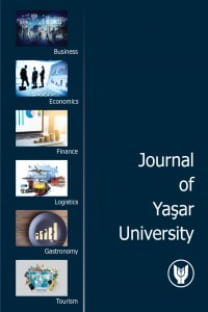Kayıt Dışı İstihdam, Gelir Vergisi Ve Ekonomik Büyüme Arasındaki İlişkinin Türkiye Ekonomisi Açısından Değerlendirilmesi
The informal economy has become one of the most important problems in our country as a result of informal employment in working life. While economic, legal, social and cultural reasons are influential in the emergence of informal employment, the financial burden on employment are shown as one of the most important causes of informal employment in Turkey. However, the greatest loss of informal economic activities to the economy is tax loss. The tax burden on formal employees is increased to eliminate deficits in the government's budget result of informal activities. This situation further increases the informality. For this reason, the state is trying to reduce informality with policies. In this study, the relationship between informal employment, the index of industrial production as a determinant of economic growth and tax revenues was investigated by using Multiple Regression Analysis with monthly data for 1996-2017 period. According to the analysis results, there is a positive relationship between the industrial production index and informal employment, but a negative relation with the income tax.
Anahtar Kelimeler:
Informal economy, Informal employment, Income tax, Industrial production index, CPI
Evaluation Of The Relationship Between Informal Employment, Income Tax And Economic Growth On Terms Of Turkey Economy
___
- Akalın, G., Ferdi K. (2007), “Türkiye’de Kayıt dışı Ekonomi ve Büyüme İlişkisi”, ZKÜ Sosyal Bilimler Dergisi, 3(5), 71-87Altuğ, O. (1999). Kayıt Dışı Ekonomi, Türkmen Kitabevi, İstanbulAy, A., İ. H. Sugözü, N. Köse (2005), “Vergi Yükündeki Değişmelerin Kayıt Dışı Ekonomiye Etkisinin Simetrikliği Üzerine Bir İnceleme: Türkiye Örneği (1968–2001)”, İktisat İşletme ve Finans Dergisi, 20(233), August, 52–64Ay, A., İ.H. Sugözü, S. Erdoğan (2014), “Türkiye’de Vergi Yükünün, Enflasyonun ve Vergi Affı Beklentisinin Kayıt Dışı Ekonomiye Etkisi Üzerine Ampirik Bir Uygulama (1985-2012)”, Selçuk Üniversitesi Sosyal Bilimler Enstitü Dergisi, Dr.Mehmet Yıldız Özel Sayısı, 23-32Baldemir, E., F.Gökalp, M. Avcı (2006), “Türkiye’de Kayıt dışı Ekonominin Mimic Model İle Tahminlenmesi”, SDÜ İİBF Dergisi, 1-14Chen, M. A. (2012). “The Informal Economy: Definitions, Theories andPolicies”, Women in Informal Employment Globalizing and Organizing(WIEGO) Working Paper, No: 1, August.Elveren A. and G. Özgür (2016), “The Effect of Informal Economy on Income Inequality: Evidence from Turkey”, Panoeconomicus, 63(3), 293-312Erkuş, H. and Karagöz, K. (2009). “Türkiye’de Kayıt Dışı Ekonomi ve VergiKaybının Tahmini”. Maliye Dergisi, 156, 126-140.Gelir İdaresi Başkanlığı, Genel Bütçe Vergi Gelirleri, 2018Granger, C. W. J. and Newbold, P. (1974). “Spuriousregressions in econometrics”.Journal of Econometrics, No: 2, 111- 120.Gujaratı, D. N. (2006). Temel Ekonometri, Trans. Ümit Şenesen andGülay Göktürk Şenesen, Literatür Yayıncılık, İstanbul.Gujarati, D.N. and Porter, D.C. (2009). Basic Econometrics. 5th Edition, McGraw Hill Inc., New York.Güloğlu, T., Korkmaz, A. and Kip, M. (2003). “Türkiye’de Kayıtdışı İstihdamGerçeğine Bir Bakış”. Sosyal Siyaset Konferansları Dergisi, 45 (1), 51-95.Hazine ve Maliye Bakanlığı (2018), Ekonomi Sunumu, http://www.maliye.gov.tr/, Accessed 15.09.2018Işık, N. ve Kılınç, E. C. (2009), “OECD Ülkelerinde Vergi Yükü ve Vergi Türleri:Karşılaştırmalı Bir Analiz”, KMU İİBF Dergisi, 11(17), 147-173.Kalkınma Bakanlığı, Kalkınma Planları, www.kalkinma.gov.tr, (15.09.2018)Karaaslan, E. (2010). Kayıt Dışı İstihdam ve Neden Olduğu Mali Kayıpların BütçeÜzerindeki Etkileri: Türkiye Örneği. Mali Hizmetler Derneği, Yayın No:7,Ankara.OECD, (2016), Revenue Statistics 1965-2015, Statistiques Des Recettes Publiques1965-2015.Rakıcı C. and C. Aydoğdu (2017), “2000 Yılı Sonrası Türkiye’de Vergi Performansının Değerlendirilmesi”, Sosyoekonomi, Vol 25(33), 221-239Sosyal Güvenlik Kurumu (SGK), (2018).http://www.sgk.gov.tr/wps/portal/sgk/tr/ , Accessed 03.07.2018.TCMB, Elektronik Veri Dağıtım Sistemi, http://www.tcmb.gov.tr , Accessed 03.07.2018.TÜİK, (2018), İşgücü İstatistikleri, www.tuik.gov.tr, Accessed 01.09.2018.Yağmur, A. S. (2013). “Seçilen Ülkeler ve Ülkemizdeki Kayıt Dışı İstihdamınKarşılaştırılması ve Seçilen AB Üyesi Devletlerde Kayıt Dışı İstihdamlaMücadele Örnekleri”. Sosyal Güvence Dergisi, N. 3, 1-19.
- ISSN: 1305-970X
- Başlangıç: 2006
- Yayıncı: Yaşar Üniversitesi
Sayıdaki Diğer Makaleler
Benbouziane MOHAMMED, Saidi TARİK, Djazia CHIB
Korumacılık Sonrası Endüstri-İçi Ticaret Değişti mi?: Amerikan Otomotiv Endüstrisinin Durumu
Gülçin Elif YÜCEL, Ayfer USTABAŞ
Türkiye’de Dış Ticaret Açığı Sürdürülebilir mi? Ekonometrik Bir Analiz
Special Issue on Applied Economics and Finance Editorial
Çağatay BAŞARIR, İbrahim Murat BİCİL, Özer YILMAZ
Türkiye’de Tüketim ve Gelir Eşitsizliği
Reel Döviz Kurlarının Fourier Durağanlık Analizi ile Test Edilmesi
